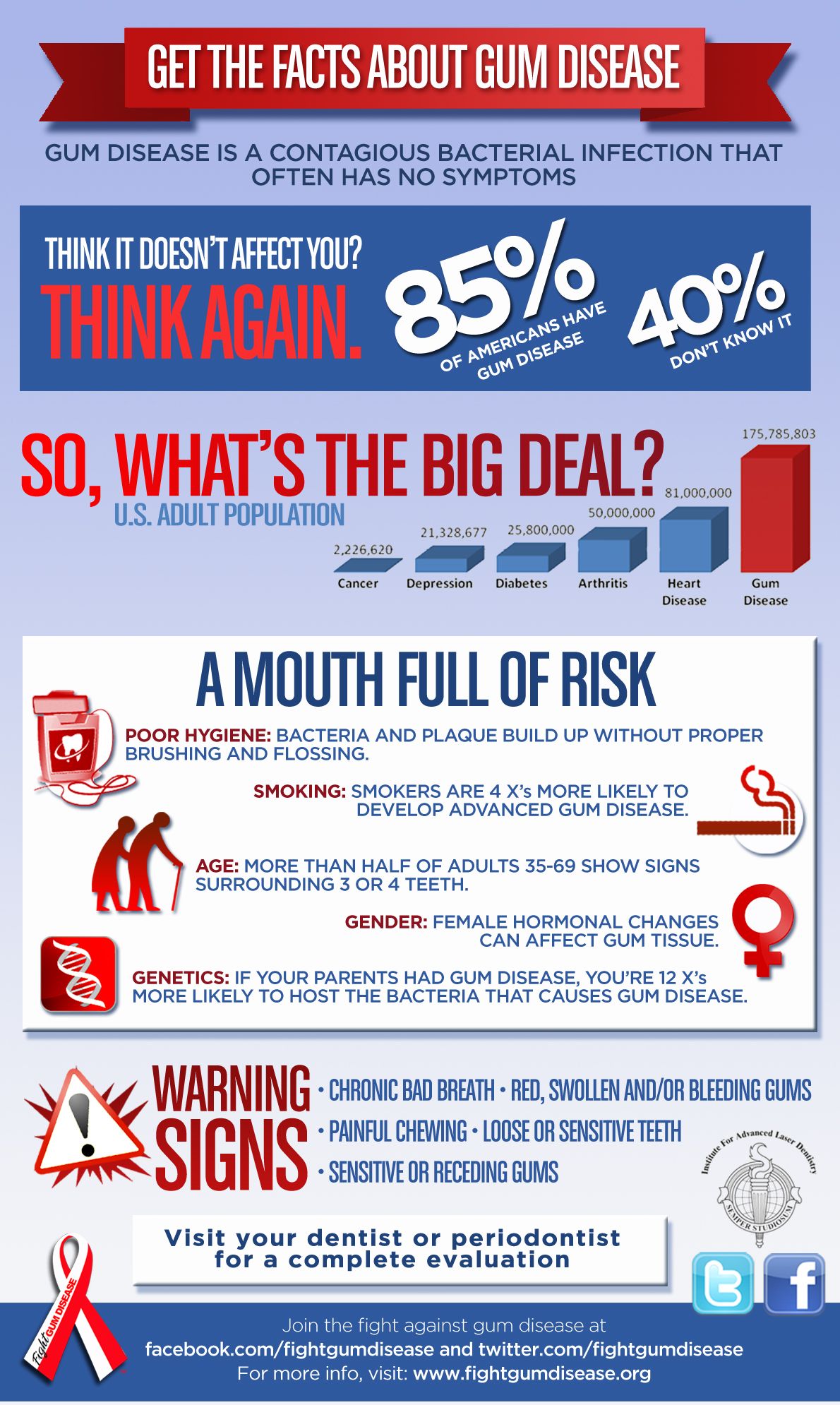We Can Prevent Gum Disease: Celebrate Gum Care Month With Us

Periodontal disease (periodontitis), also known as Gum Disease, has been known as the leading cause of tooth loss in adults for quite some time. Unfortunately, the damage isn’t limited to just the mouth. Gum disease has been linked to an increased risk of serious degenerative diseases, like heart disease. The team at the offices of Thomas L. Anderson and Associates joins dental practices and professionals around the country each September in celebration of National Gum Care Month.
Now you know why gum care is SO IMORTANT!! However, Gum Disease can be prevented! There are several ways you can avoid the beginning of gum disease. We want you to be on the lookout for these tell-tale signs so, we’ve gathered some interesting information and statistics for you as well.
What is Gum Disease?
Periodontal disease starts with a sticky film of plaque bacteria that forms on your teeth, just like tooth decay. If plaque is not removed, it will collect around your gum line and cause your gums to become inflamed and irritated. This early stage of gum disease is called Gingivitis. The good news is that it can be reversed easily with consistent and thorough brushing and flossing.
However, if it is not removed regularly, this plaque will harden into tartar. Your gums become increasingly red, swollen, and inflamed as tartar builds up around the gum line and they will eventually pull away from the tooth, forming a loose pocket. As more bacteria and tarter accumulate in these “pockets”, the destructive toxins begin to infect and destroy the gums, bone and ligaments that support your teeth. This advanced phase of Gum Disease is called Periodontitis, or Periodontal Disease. If left untreated, periodontal disease can lead to tooth loss, because the gums can no longer hold your teeth in place.
Related Article: Periodontal Disease: Prevention of Gum Disease and Treatment
Different Forms of Gum Disease
There are different forms of Periodontitis and it is more serious than it may seem at first.
Aggressive Periodontitis:
- occurs during a period of growth in young people
- rapid gum recession
- due to vitamin depletion, not bacteria
Chronic Periodontitis:
- cycles of rapid progression and then cycles of remission
- can happen on its own or in response to dental treatment
Gum Disease Can Affect More Than Your Smile
Look Younger: Cosmetic
It’s a well-known fact that people with a healthy smile tend to look younger. However, Periodontitis affects much more than the aesthetic look of your pearly white smile and is important for more than cosmetic reasons.
Talk & Chew: Function
It’s also easy to understand that it’s easier to talk and chew when your teeth are functional and it’s less costly to keep all of your own teeth.
Healthy Body:
Gum disease is also a systemic disease that is related to the body’s reaction to bacteria that can have far-reaching effects on your overall health. By completely avoiding periodontal disease or treating it, you’re helping to protect your body from other systemic inflammatory conditions, such as heart disease, diabetes, and autoimmune conditions. As well as, osteoporosis, respiratory disease, and cancer.
Tooth Loss Stats:
Here are a few staggering statistics:
- Missing 1 tooth: the average person age 20-39
- Missing 3+ teeth: the average 40-49-year old
- Missing 8 teeth: the average 60+ person
We know what you’re thinking … I had my 4 wisdom teeth pulled!! No wonder these numbers are so high!! Bad News: These statistics do NOT include wisdom teeth that have been removed AND this tooth loss is typically caused by gum disease.
Healthy Gums vs. Diseased Gums
Do you know what healthy gums look like? Gums should be firm and pink with no bleeding and no discomfort.
Signs of bad gums include:
- loose or shifting teeth
- gum tenderness
- bleeding gums
- chronic bad breath
- bad taste in your mouth
- redness, swelling, pus around teeth and gums
- receding gums
- If you have dentures, they may not fit correctly
Remember, it’s important to get treatment at the first sign of gum disease.
Related Article: Health RIsk of Gum Disease: Healthy Teeth Are More Than a Pretty Smile
Prevent Gum Disease
You can help take care of your gums by following these simple guidelines:
- Healthy Brushing: Brush at least twice a day
- Flossing Correctly: Floss at least once a day to remove debris between the teeth and near the gums. It is recommended you floss before brushing so your toothbrush can wipe away leftover bacteria and debris. Gently floss between each tooth, using clean sections of floss each time. Avoid snapping the floss down onto the gums.
- Seeing Your Dentist: You should receive a dental exam and cleaning every six months if not more often. Notify your dentist if you have concerns about your teeth and gums or you are experiencing pain or discomfort.
- Healthy Diet: Consume a regular diet of healthy foods and liquids. More sugar in your diet tends to lead to more lingering and sticky bacteria. Rinse your mouth with water after eating and drinking other beverages.
- Avoiding Substances: A great way to help your teeth and gums stay healthy is avoiding tobacco and limiting your alcohol intake. This includes smoking and vaping. Try to avoid drinking too much soda and energy beverages, candies, sugary snacks, and fast food.
- Get treatment at the first signs of gum disease. Swollen, bleeding gums; pockets of pus; or gums that have pulled away from your teeth are the most dramatic signs of periodontal disease. Subtler changes, such as widening spaces between your teeth, and bridges or partial dentures that don’t fit as well as they once did, may also signal periodontitis.
- Children’s Dental Health: If you have children, take this opportunity to review their dental care routines and emphasize the importance of daily tooth care.
- Other Tips: Replace your toothbrush every two to three months, depending on the wear. Exercise regularly to increase blood flow and encourage saliva flow. Choose a toothpaste that is best for your dental needs.
Related Article: Children’s Dental Health: Tips to Keep Teeth Strong & Healthy
When almost half of Americans suffer some form of gum disease, why wait?
Now you understand why keeping your gums healthy is such an important task – they keep your teeth in place! AND you know what to do to help keep you and your smile in the best possible health and avoid Gum Disease.
If you have questions or concerns about your gum health, please give us a call, the expert team at the offices of Thomas L. Anderson and Associates will be happy to schedule your dental appointment and help you keep your gums, teeth and mouth healthy. Call 816-373-4440 to schedule your dental appointment or smile consultation.
Schedule your appointment to meet with any of our skilled dentists at one of our three conveniently located dental office locations within the Kansas City area, including Lee’s Summit / Independence, the Country Club Plaza and Downtown Kansas City. The gentle dentists and expert team at Thomas L. Anderson and Associates look forward to working with you to treat your dental emergency, achieve proper oral health and a beautiful smile that will last a lifetime. If you have any questions about your dental insurance benefits, please do not hesitate to contact us. We are happy to review your policy! Please give us a call today to schedule an appointment and become part of our dental family.
